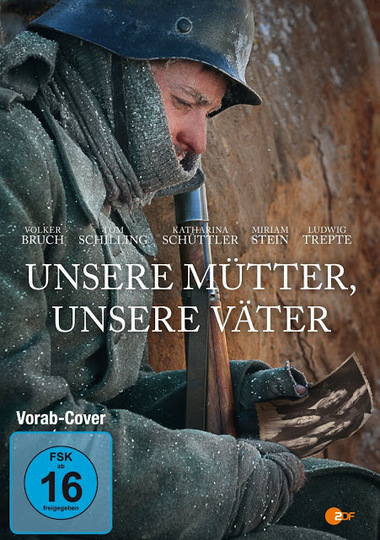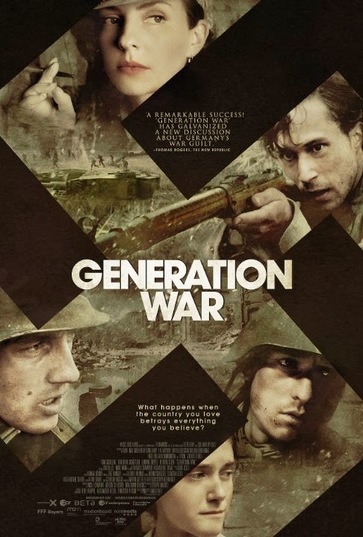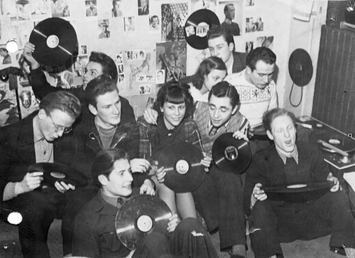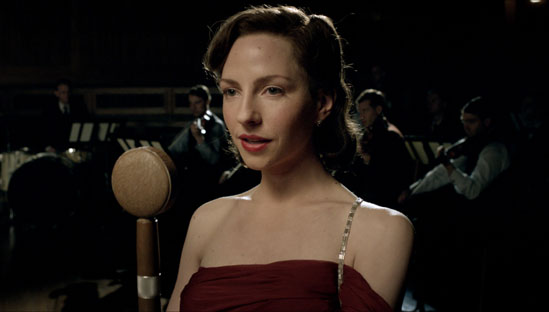The Good Germans?
A controversial German movie / TV series looks at World War 2 through the eyes of a vanishing generation.
The 2014 German production Our Mothers, Our Fathers, directed by Philipp Kadelbach, was shown on as a television mini-series in Germany and Europe, and released in some American cinemas as Generation War.
The series was praised for its high production values, great cinematopgraphy, excellent use of locations standing in for the Ukraine, the eastern front and Poland, and generally capable acting. Generation War effectively juggles five separate plots involving its five main characters within settings ranging from a recording studio and a night club to makeshift field hospitals, Ukrainian villages, an embattled telegraph office and a battlefield on the steppes. The overall concept is based on the HBO series Band of Brothers and The Pacific, and some of the scenes are heavily indebted to Sam Peckinpah's Cross of Iron. Spielberg's Schindler's List and Saving Private Ryan, along with Samuel Fuller's The Big Red One.
Yet Generation War is a definte must-see. It's genuinely entertaining and remarkably well-paced, with main characters who are sympathetic and are only occasionally stereotypes. It must be one of the few mini-series that makes you wish it had been longer and that some scenes and situations had been developed in greater detail. Indeed, the issue of how the surviving characters might have coped in the aftermath of defeat would make an interesting series in itself. Generation War also deals with aspects of World War 2 usually overlooked by Hollywood. Thus the fighting occurs on the eastern front, not the west. Two of the major characters are female, and both work. Greta is an ambitious singer; Charlotte is a nurse, a job which opens the way for scenes set in field hospitals, which effectively details the horrific conditions under which medical staff worked. A few scenes depict Berlin streets and housing conditions during the war. These features are fresh and interesting and add greatly to the sense of an authentic and vibrant social canvas.
The series was praised for its high production values, great cinematopgraphy, excellent use of locations standing in for the Ukraine, the eastern front and Poland, and generally capable acting. Generation War effectively juggles five separate plots involving its five main characters within settings ranging from a recording studio and a night club to makeshift field hospitals, Ukrainian villages, an embattled telegraph office and a battlefield on the steppes. The overall concept is based on the HBO series Band of Brothers and The Pacific, and some of the scenes are heavily indebted to Sam Peckinpah's Cross of Iron. Spielberg's Schindler's List and Saving Private Ryan, along with Samuel Fuller's The Big Red One.
Yet Generation War is a definte must-see. It's genuinely entertaining and remarkably well-paced, with main characters who are sympathetic and are only occasionally stereotypes. It must be one of the few mini-series that makes you wish it had been longer and that some scenes and situations had been developed in greater detail. Indeed, the issue of how the surviving characters might have coped in the aftermath of defeat would make an interesting series in itself. Generation War also deals with aspects of World War 2 usually overlooked by Hollywood. Thus the fighting occurs on the eastern front, not the west. Two of the major characters are female, and both work. Greta is an ambitious singer; Charlotte is a nurse, a job which opens the way for scenes set in field hospitals, which effectively details the horrific conditions under which medical staff worked. A few scenes depict Berlin streets and housing conditions during the war. These features are fresh and interesting and add greatly to the sense of an authentic and vibrant social canvas.
Noteworthy and controversial features
Popular music
One of the series' most convincing features is its use of scenes involving the music popular with the war years generation. When most movies, TV films, and documentaries do portray music of the era it is almost always selected from the extensive repertoire of rousing German military marches and sentimental songs. Lili Marlene is the best-known example of the latter genre; it was also vey popular with Allied troops. "Torch' songs in the Marlene Dietrich style , slow and lagubrious, feature in Generation War through the interesting character of Greta, a talented singer determined to emulate Dietrich's style and willing to make her fame and fortune by employing her physical as well as her vocal charms. Some of the most convincing sequences of Generation War show Greta performing in nightclubs, recording studios and in shows to entertain soldiers.
However, another form of music prominently featured in the movie was officially condemned by Nazi authorities as the degenerate product of so-called 'inferior' races e.g. Jews and negroes. Despite this (or possibly because of it) Jazz, or Swing music, was surprisingly popular among Germans, especially the young, during the Nazi years. Followers of such music often called themselves "swing kids". Some swing kids belonged to youthful anti-Nazi groups, such as the Edelweiss Pirates and the Cologne Navajos, who engaged in the heroic but incredibly dangerous task of opposing the Nazi regime
Generation War begins with the five main characters, one of whom is Jewish and a jazz musician, playing and dancing to swing music. Their festivities are interrupted by a visit from an SS officer who warns them against such dangerously unGerman activities.
One of the series' most convincing features is its use of scenes involving the music popular with the war years generation. When most movies, TV films, and documentaries do portray music of the era it is almost always selected from the extensive repertoire of rousing German military marches and sentimental songs. Lili Marlene is the best-known example of the latter genre; it was also vey popular with Allied troops. "Torch' songs in the Marlene Dietrich style , slow and lagubrious, feature in Generation War through the interesting character of Greta, a talented singer determined to emulate Dietrich's style and willing to make her fame and fortune by employing her physical as well as her vocal charms. Some of the most convincing sequences of Generation War show Greta performing in nightclubs, recording studios and in shows to entertain soldiers.
However, another form of music prominently featured in the movie was officially condemned by Nazi authorities as the degenerate product of so-called 'inferior' races e.g. Jews and negroes. Despite this (or possibly because of it) Jazz, or Swing music, was surprisingly popular among Germans, especially the young, during the Nazi years. Followers of such music often called themselves "swing kids". Some swing kids belonged to youthful anti-Nazi groups, such as the Edelweiss Pirates and the Cologne Navajos, who engaged in the heroic but incredibly dangerous task of opposing the Nazi regime
Generation War begins with the five main characters, one of whom is Jewish and a jazz musician, playing and dancing to swing music. Their festivities are interrupted by a visit from an SS officer who warns them against such dangerously unGerman activities.




